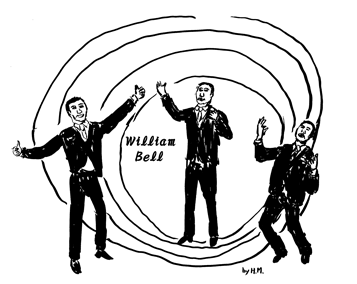

In spite of having not more than that of Motown or Atlantic, Stax also had a fair number of artists as a recording company. There were some who stayed in Stax from first to last and William Bell was one of them. He has a clear and reassuring tenor voice which is suited to earnest ballads. What I hear for the first time was the alternate take of Any Other Way compiled on a Stax's early rares "4000 Volts of Stax & Satelite", which was uncommonly arranged by strings in addition to Stax's usual formation with guitar, bass, keyboard, drums and horns. Bell was at first in a popular group in Memphis, The Del-Rios, whose Pop-Eye The Sailor Man, a novelty uncommonly in Stax, is also compiled on this album. And then I got his signature tune on "The Stax Story". You Don't Miss Your Water penetrates into my mind and knocks me out for his earnest delivery with the arrangement of a piano and symbals simply flowing and a organ and horns overlapping. It is one of most important southern soul ballads, many of which have such kind of 'weeper' appeared on country tunes.
As for his other tunes on "The Stax Story", Bell also has a condolence-like tune dedicated to Otis Redding A Tribute to a King, meanwhile, Private Number, a duet with a little sandy alto Judy Clay, I think the best. Beginning with fine guitar licks, strings and horns effectively raise Bell and Clay's supreme reading of plain lyrics. Japanese country music Enka also has such a kind of world view in its lyrics, so I wish there would be a heartfelt duet tune, not in easy karaoke use. I Forgot to Be Your Lover is also a ballad stirring your emotion. Albert King's Born Under a Bad Sign was co-written by Bell and Booker T Jones and it suggests Bell should be not only a singer but a pretty good composer. Furthermore, on the album "The Original Soul Christmas" compiling the songs of artists under the distribution of Atlantic, you can hear his Everyday Will be Like a Holiday featuring jingle bells.
This guy was not so blessed with hits, though. It was lucky for him to have good sales of his debut You Don't Miss Your Water in Stax, but he served in the army for two years. When Bell returned the room of pickup singers is already full, which is supposed to be the fate of a record company keeping many artists. Furthermore, in Motown's heyday most of crossover sides were hilarious and danceable, and this situation put a balladeer Bell in a worse position. Times went by and he managed to release a best-like album "The Soul of a Bell". In addition to a weeping ballad Everybody Loves a Winner and soaring Never Like This Before or Eloise (Hang on in There), this album contains re-recordings of Bell's former tunes and renditions of Aretha Franklin's Do Right Woman, Do Right Man and Otis Redding's I've Been Loving You Too Long and so on. They are well worth listening. Tunes on "The Best of William Bell" are Stax recordings of after 1968, including Private Number, needless to say, My Baby Specializes of the same duo, and less Stax-ified, up-tempo pop and funky sides like his own Born Under a Bad Sign or Save Us. (It may be said in passing that his duet partner Judy Clay had already released 'the first interracial male and female duo ever' album "Storybook Children", with Billy Vera who had a blockbuster At This Moment in the '80s and wrote many liner notes on various CDs.)
After Stax's bankruptcy and moving to Mercury, Bell had his biggest hit on chart Tryin' to Love Two, one of infidel songs in vogue at that time. I happened to hear the original Easy Comin' Out, (Hard Goin' in) and Tryin' to Love Two on a randomly compiled "Ocean Drive vol.4". They are sophisticated and pop tunes influenced by Al Green's Hi Sound and Philly soul. Their sound are far from the slow and tight Stax years. Most of sides on "Collectors Edition" including post-Stax tunes, are re-recordings in the '80s of his own label Wilbe launched in Atlanta, however, there is a moderate duet hit I Don't Wanna Wake Up (Feelin' Guilty) in his own composition. It's true that the powerful voice of Otis or Sam & Dave is a synonym for Stax, but the 'weeper' of William Bell's clear voice cannot be abandoned. (2005/03/27)(2007/01/10)